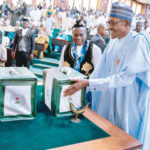
Critics argued that the show of opulence and ostentation smacked of insensitivity to the situation of the masses of Nigerians, many of who populate his constituency, who live in dire circumstances, struggling to eke out a living under excruciating economic conditions. Some critics also remarked that the number plate on the G-Wagon was reminiscent of Afro pop star, David Adeleke’s (Davido) gift to his girlfriend. The gift by Davido was also a G-Wagon with the inscription “Assurance” on the number plate, an inscription also borne by the car that the federal lawmaker presented to his wife. Not a few wondered why a young music star’s outlandish lifestyle would be a social inspiration to a legislator of Gbajabiamila’s standing.
In reaction, Gbajabiamila argued that the event was a private affair involving only a limited number of friends and relatives, that it was not meant to be a public display, and that he had worked very hard to save some money in order to be able to present the gift to his wife who had been with him through thick and thin for 26 years. While there is nothing wrong in appreciating one’s spouse, we think that the tendency towards ostentation displayed by Gbajabiamila is deplorable. It is the hallmark of the elite culture in Nigeria. It is seen in the way and manner public officers, especially governors, ministers and federal legislators, move around in large entourages and long convoys of vehicles, in the budgets of state houses of assembly dedicated to food and wardrobes, and in their wasteful foreign trips and lavish social events and lifestyles.
In order to establish and sustain such lifestyles, they award themselves lavish allowances for every item under the sun: wardrobe, newspapers and media, aides and assistants, and constituency projects. This is apart from the bribes, kickbacks and brazen stealing of public funds for which many of them have become regular visitors to the offices of the Economic and Financial Crimes Commission (EFCC) and the courts over allegations of corruption. We maintain that the lifestyle of the political elite is a mark of irresponsibility and lack of responsiveness and empathy for the ordinary people whose living conditions constitute the yardstick of government performance in service delivery.
ALSO READ: Ambode lauded on new look Taqwa Bay
There is a huge leadership deficit among the elite. They are unable to reach a consensus on the importance of public welfare as the foundation of stability and progress. There is a huge gap between the call of leadership and the focus of public office-holders. For many politicians, public office is a call to revelry and debauchery. How can leaders leading such ostentatious lifestyles convince private citizens that the government needs the philanthropy of private individuals and corporate bodies to prosecute social programmes that have been circumscribed by poor funding?
Certainly, given the levels of inequality and poverty in the country, the time has come for the government to introduce taxes that promote frugality and encourage the wealthy to support public welfare. The capital gains tax policy that was enacted through a 1990 Act is not being effectively enforced. The government should also consider introducing inheritance, gifts and luxury taxes. These will go a long way in reducing the provocative display of ostentation which has become a culture in public life. More importantly, revenue from such taxes can be invested in social programmes that target the poor.
Interestingly, a caring, frugal and disciplined governance environment will not only shore up the legitimacy of the Nigerian state, it will lead to a more organised, safer and cleaner physical and social environment for peace, liberty, stability and happiness.




